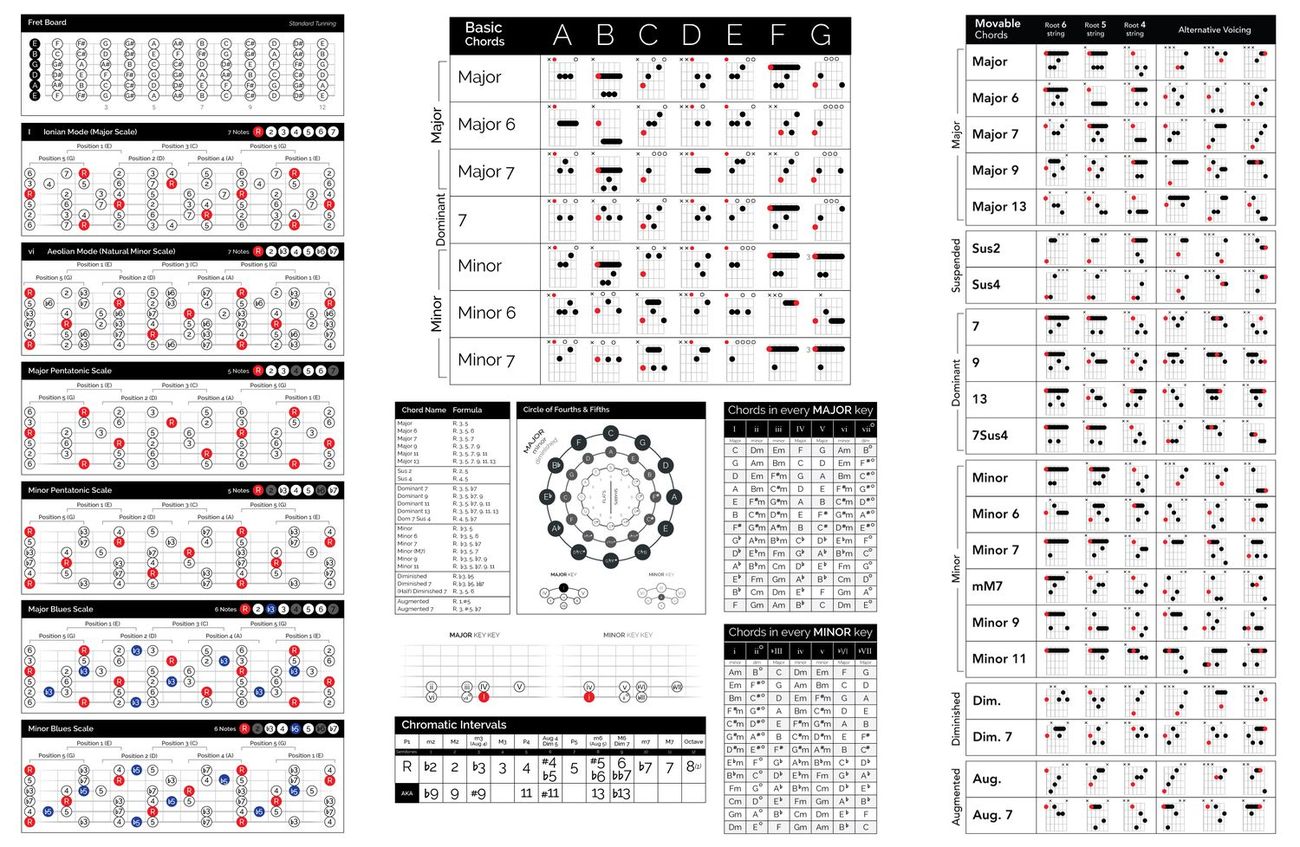Home>Production & Technology>Music Theory>Where Can I Learn Music Theory For Free


Music Theory
Where Can I Learn Music Theory For Free
Published: February 1, 2024
Looking to learn music theory for free? Explore our comprehensive resources and tutorials on music theory to enhance your understanding of the subject.
(Many of the links in this article redirect to a specific reviewed product. Your purchase of these products through affiliate links helps to generate commission for AudioLover.com, at no extra cost. Learn more)
Table of Contents
Introduction
Music theory is the backbone of understanding how music works. It encompasses the study of rhythm, melody, harmony, and structure, among other elements. Mastering music theory is crucial for any musician or songwriter, as it provides a solid foundation for composing, improvising, and analyzing music. While formal education in music theory can be expensive, there are numerous resources available online that offer free learning opportunities.
In this article, we will explore various online resources where you can learn music theory for free. Whether you are a beginner looking to grasp the basics or an experienced musician seeking to expand your knowledge, these resources will provide you with the necessary tools to enhance your understanding of music theory.
Before we dive into the specific resources, it’s important to note that while free online resources can be highly valuable, they may lack structured curriculums or personalized guidance. It is essential to approach self-study with dedication and discipline, setting goals and consistently practicing the concepts you learn.
Additionally, it is worth mentioning that music theory is a vast subject, and different resources may approach it from slightly different perspectives. It’s perfectly normal to explore multiple resources to gain a well-rounded understanding of the subject.
Now, let’s explore the various online resources available for learning music theory for free.
Online Resources
The internet offers a plethora of online resources for learning music theory. These resources include articles, tutorials, interactive lessons, quizzes, and more. Here are some of the top platforms that provide free music theory education:
- MusicTheory.net: MusicTheory.net is a popular website that offers a comprehensive range of lessons and exercises for beginners to advanced learners. The interactive lessons cover topics such as note reading, scales, intervals, chords, and ear training. The site also provides tools like a virtual keyboard and a staff paper generator.
- Teoria: Teoria is another excellent resource for learning music theory. It offers tutorials, exercises, and practice tools that cover a wide range of topics, including notation, intervals, chords, and analysis. Teoria also has a vast collection of music theory reference materials.
- Open Music Theory: Open Music Theory is an open-source textbook that covers various music theory topics. The content is written in a clear and accessible manner, making it suitable for both beginners and intermediate learners. The site also provides interactive exercises and examples to reinforce the concepts.
- Coursera: Coursera is an online learning platform that offers free music theory courses from renowned universities and institutions. These courses cover a range of topics, from introductory music theory to more advanced subjects like orchestration and composition. While some courses require a fee for a certificate, you can access the course materials and lectures for free.
These online resources provide a wealth of information and interactive learning experiences. Depending on your learning style and preferences, you can choose the platform that best suits your needs. Remember to take advantage of the exercises and quizzes provided to reinforce your understanding of the concepts.
In the next sections, we will explore additional resources such as YouTube channels, websites and blogs, mobile apps, and music theory courses that can further aid you in your music theory journey.
YouTube Channels
YouTube has become a treasure trove of educational content, and music theory is no exception. There are several YouTube channels dedicated to teaching music theory, offering a visual and auditory learning experience. Here are some notable YouTube channels that provide free music theory lessons:
- MusicTheoryForGuitar: This channel focuses on music theory specifically tailored for guitarists. The lessons cover topics such as scales, chords, chord progressions, and improvisation. The instructor breaks down complex concepts into easy-to-understand explanations and provides demonstrations on the guitar.
- Adam Neely: Adam Neely’s channel combines music theory, bass playing, and analysis. His videos delve into advanced topics like polyrhythms, jazz harmony, and improvisation, offering valuable insights into the theoretical aspects of music. Neely’s engaging teaching style makes complex concepts more approachable.
- Michael New: Michael New’s channel is renowned for its clear and concise explanations of music theory. His videos range from beginner-friendly content like note reading and basic rhythm to more advanced topics like chord extensions and modal interchange. New’s channel is a fantastic resource for those seeking a comprehensive understanding of music theory.
- Signals Music Studio: Signals Music Studio offers in-depth lessons on music theory and song analysis. The channel covers various topics, including scales, chord progressions, songwriting techniques, and music production. The instructor uses practical examples, real songs, and visual aids to illustrate the concepts effectively.
These YouTube channels provide a dynamic and engaging way of learning music theory. They often include examples and demonstrations, allowing you to see and hear the concepts in action. Be sure to explore these channels, subscribe, and engage with the community to enhance your music theory knowledge.
In the following sections, we will discuss websites and blogs, mobile apps, and music theory courses that offer additional learning opportunities.
Websites and Blogs
Aside from dedicated music theory platforms and YouTube channels, there are various websites and blogs that provide valuable resources for learning music theory. These platforms offer articles, tutorials, exercises, and other materials to help you deepen your understanding of music theory. Here are a few noteworthy websites and blogs:
- Musical U: Musical U is a comprehensive website that covers various aspects of music theory and ear training. It offers articles, tutorials, and courses specifically designed to help musicians develop their musicality and understanding of theory. The site also provides interactive tools and exercises to sharpen your ear training skills.
- Art of Composing: Art of Composing is a blog that focuses on the art and craft of composing music. While it primarily covers composition techniques, it also delves into music theory concepts that are relevant for composers. The blog offers articles, tutorials, and resources that explore topics like harmony, form, and melody.
- Musicians’ Corner: Musicians’ Corner is a website that offers a wide range of resources for musicians, including articles on music theory. The site covers topics like scales, chords, rhythm, and music analysis. It also provides practice exercises and tools to reinforce your understanding of the concepts.
- Hooktheory: Hooktheory is a website that combines music theory and songwriting. It offers interactive tools that allow you to analyze popular songs and understand their chord progressions and melodies. The site also contains articles and tutorials that explain various music theory concepts in the context of songwriting.
These websites and blogs provide diverse perspectives and valuable insights into music theory. They cater to different learning styles and offer a variety of resources to help you deepen your understanding of the subject. Explore these platforms and take advantage of the articles, tutorials, and exercises they provide.
In the next section, we will discuss mobile apps that can serve as handy companions for learning music theory on the go.
Mobile Apps
In our fast-paced, mobile-centric world, learning music theory on the go has become easier than ever. There are several mobile apps available that provide convenient and interactive ways to learn and practice music theory. Here are a few notable apps:
- Yousician: Yousician is a popular app that offers music lessons for various instruments, including guitar, piano, ukulele, and bass. The app provides interactive lessons that cover music theory topics, along with practice exercises and tutorials. Yousician also offers personalized feedback to help you progress in your learning journey.
- Complete Ear Trainer: Complete Ear Trainer is an app focused on ear training, an essential component of music theory. It offers exercises and quizzes to improve your ability to identify intervals, chords, scales, and melodies by ear. The app provides a structured approach to ear training and tracks your progress over time.
- Music Tutor: Music Tutor is an app that helps you improve your note-reading skills. It presents quizzes to test your ability to identify notes on the staff and on a keyboard. The app offers different difficulty levels and customizable quizzes to cater to your individual learning needs.
- Music Theory Helper: Music Theory Helper is an app that covers various music theory concepts, including intervals, scales, and chords. It provides lessons, quizzes, and reference materials to enhance your understanding of music theory. The app also includes helpful tools like a keyboard and a metronome.
These mobile apps make learning music theory accessible anytime, anywhere. They offer interactive and engaging experiences, allowing you to learn and practice at your own pace. Whether you’re waiting for a bus or have a few minutes to spare, these apps can be handy companions for honing your music theory skills.
In the following section, we will discuss music theory courses that provide more structured and comprehensive learning opportunities.
Music Theory Courses
If you prefer a more structured and comprehensive approach to learning music theory, enrolling in a music theory course can be an excellent option. While some courses may require a fee for a certificate or access to additional materials, many platforms offer free course materials that cover a wide range of music theory topics. Here are a few platforms that provide free music theory courses:
- Coursera: Coursera offers free music theory courses from prestigious institutions like the Berklee College of Music and the University of Edinburgh. These courses cover various topics, from introductory music theory to advanced composition and analysis. The courses typically include video lectures, quizzes, and assignments to reinforce your understanding.
- Open Yale Courses: Open Yale Courses provides access to free lectures and course materials from Yale University. Their music theory courses cover fundamental concepts and can be a valuable resource for both beginners and those with some background in music theory. The lectures are presented by Yale faculty members and are accompanied by reading materials.
- MIT OpenCourseWare: MIT OpenCourseWare offers free access to course materials from MIT’s courses. Their music theory courses cover topics such as harmony, counterpoint, and analysis. While the courses do not include interactive elements, the lecture notes and assignments can serve as a valuable resource for self-study.
- Class Central: Class Central is a platform that curates free online courses from various providers, including platforms like Coursera and edX. They have a dedicated section for music theory courses, where you can discover and enroll in free courses according to your interests and skill level.
These music theory courses provide a structured approach to learning, with lectures, assignments, and assessments to gauge your progress. They often offer a more in-depth exploration of music theory concepts and provide opportunities for interaction with instructors and fellow learners. Taking advantage of these courses can help you gain a deeper understanding of music theory and enhance your musical abilities.
Before enrolling in any course, it is important to review the course syllabus, requirements, and any associated fees if you are seeking a certificate or additional resources. This will ensure that the course aligns with your learning goals and expectations.
Now, armed with these online resources, YouTube channels, websites, mobile apps, and music theory courses, you have a wealth of knowledge at your fingertips to enhance your understanding of music theory. Remember to practice regularly, apply the concepts to your instrument or composition, and enjoy the process of discovering the intricate world of music theory.
Conclusion
Learning music theory is a valuable endeavor for any musician or music enthusiast. It provides a deeper understanding of how music works, enabling you to express yourself creatively, analyze compositions, and communicate with other musicians effectively. While formal music theory education can be costly, the internet offers a wealth of free resources to help you learn and master music theory.
In this article, we have explored various online resources, YouTube channels, websites and blogs, mobile apps, and music theory courses that provide opportunities for free music theory education. These resources offer a diverse range of content, from interactive lessons and exercises to in-depth articles and tutorials. Whether you prefer hands-on learning, video lessons, written materials, or a combination of approaches, you can find resources that cater to your preferred style of learning.
It is important to approach self-study with dedication, discipline, and consistency. Set goals for yourself, create a practice schedule, and actively engage with the materials. Remember that music theory is a vast subject, and it is normal to explore multiple resources to gain a well-rounded understanding of the topic.
By utilizing these free online resources, you can enhance your music theory knowledge and skills at your own pace and convenience. From learning the basics of notation and scales to diving into advanced topics like harmony and analysis, these resources provide the tools and guidance you need to progress on your music theory journey.
So, whether you’re a beginner looking to grasp the foundations of music theory or an experienced musician seeking to expand your knowledge, seize the opportunity to explore these free resources and unlock a deeper understanding of the language of music.
Happy learning and may your musical journey be filled with joy, creativity, and endless possibilities!











